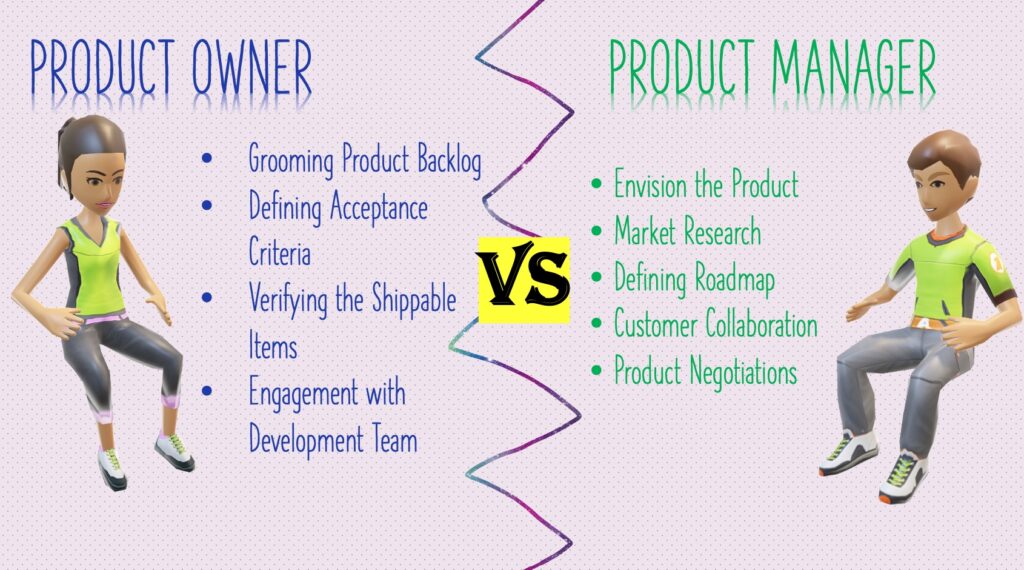What does a product owner do? What does a product manager do? Product owners and product managers, are these just different names for the same role? What is a product managers’ job description, and how does it differ from a product owner?
All these above questions are much discussed and create a great deal of confusion for many people and organizations. This article will discuss the roles and are responsibilities of each and try to end the confusion around the topic.
video tutorial : Product Owner Vs Product Manager
Well, the truth is that both these roles often overlay with each other, and there are no well-defined boundaries. That is the core reason for all the debate on the topic.
No hard-core definition exists for distinction between the roles and responsibilities of product manager and product owner. The extremity of both roles also depends on the organization’s size, structure, and culture.
Before pointing out the differences between both, let’s see who product owners and product managers are and what they do.
Product Owners:- #
Product owners are empowered by product leadership to be the central point of a team that follows Scrum. The role of a product owner is one of the three essential roles which constitute a scrum team.
Product owners need to maintain a good balance between the scrum team and other internal and external stakeholders.
Product owners are the owners of product backlog (Product backlog is a prioritized list of user stories).
While the product owner must understand the needs and priorities of the customer, they focus more on communication with the development team on what should be developed and in which order. A product owner must ensure that the criterion for acceptance is well defined and understood by the team and the test cases are complete for verification.
Product Managers:- #
Product managers are responsible for making sure that teams deliver a significant product. They are sometimes also called the CEO of their products. A product manager needs to envision a product’s needs and makes strategies for its launch and sustainability.
Product managers define the success of their product and are behind the significant decisions throughout a product’s journey.
They need to investigate the three sides of a product’s lifecycle: technology, business, and design. A product manager focuses on market research, product designing, customer involvement, licensing, and product release planning.
Product managers may work with many teams, especially in large set-ups, all working on different aspects of a product without any direct authority over the teams.

Product Owner Vs Product Manager
In many startups with tiny set-ups, the same entity does the product owner and product manager’s role. But, generally, in big organizations, both the roles get well defined and are recognized separately.
Let us now try and bullet out a few differences: -
| PRODUCT OWNER | PRODUCT MANAGER |
| Product owner is a role explicitly defined for an agile framework called Scrum. This role came into existence to take ownership and be accountable for what gets developed. If I take out Scrum from the development methodology, the role of the product owner vanishes as well. | The product manager is a job that is not based on any of the agile frameworks. A product manager will still exist if the teams are working on any other framework apart from Scrum. |
| Product owners take the ownership and responsibility of the iterative shipments scrum teams deliver. | Product managers are responsible for the success or failure of their products. |
| Product owners need to be detail-oriented on what the team needs to deliver in a time-boxed interval. | Product managers need to have a high-level vision of the product. |
| A significant part of the product owner's work is creating the user stories, defining the acceptance criteria, managing the backlog, approving the deliverables, etc. | Product managers create the product's roadmap, customer communication, negotiations, sales, launching a product, etc. |
| Product owners need to make decisions for detailed but short-term scope. | Product managers need to make decisions for a comprehensive and long-term scope. |
| Product owners define their success based on how the team is doing in terms of performance and the quality of the team's development shipments. | Product managers define their success based on revenue management and customer value. |
While I tried to highlight a few differences in both the roles, these two roles have a lot in common, which is why their responsibilities and work overlap to a reasonable extent. Both product managers and product owners work towards the success of the product. Product manager, as well as product owner, need to own skillset to deliver what customer needs. Product owner and product manager both need to strategize and make decisions.
I hope I was able to eliminate the confusion around the topic of Product Managers versus Product Owners. Do add your comments around the topic and let me know if you want me to discuss other related issues by subscribing to my newsletters below. Good Luck!!